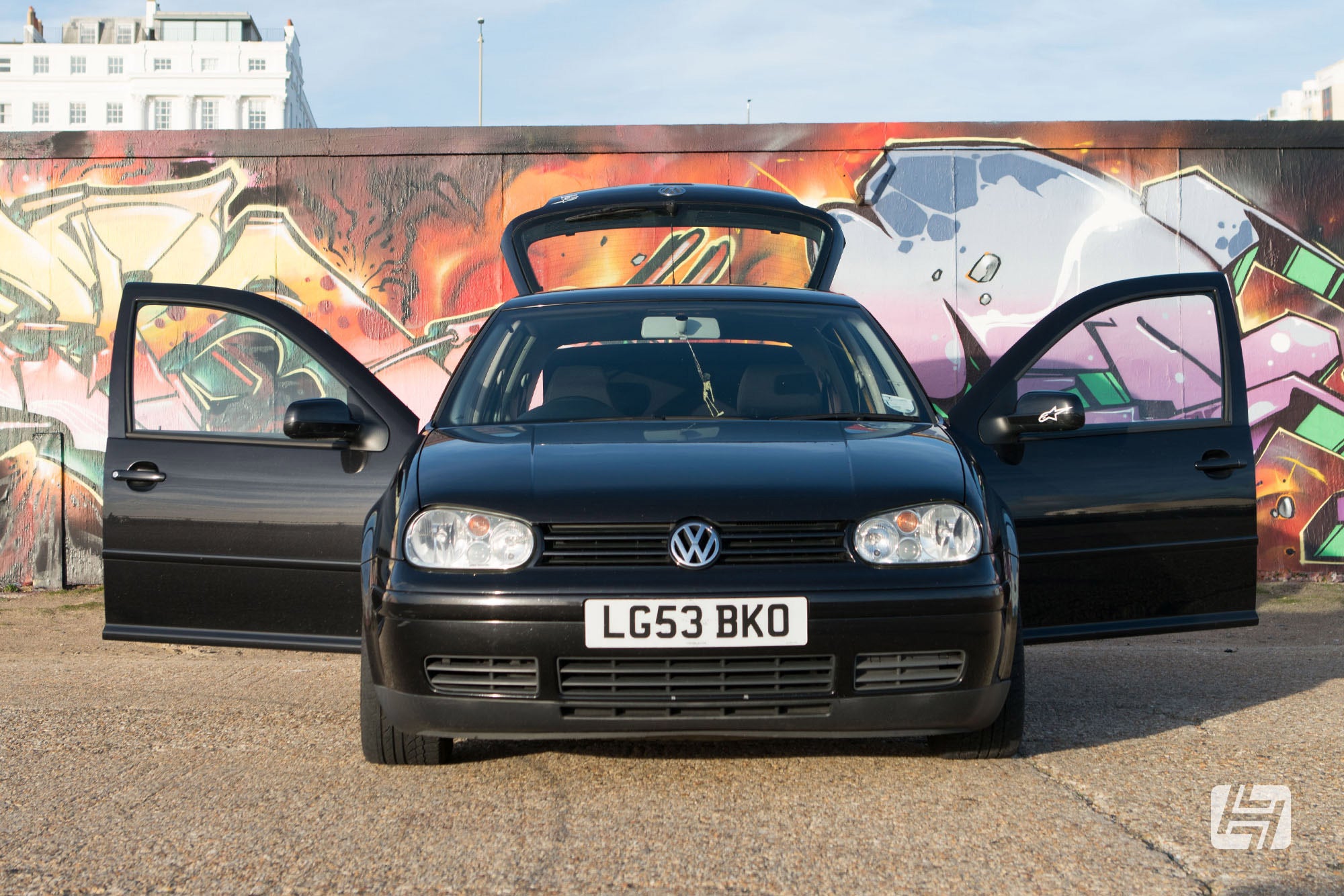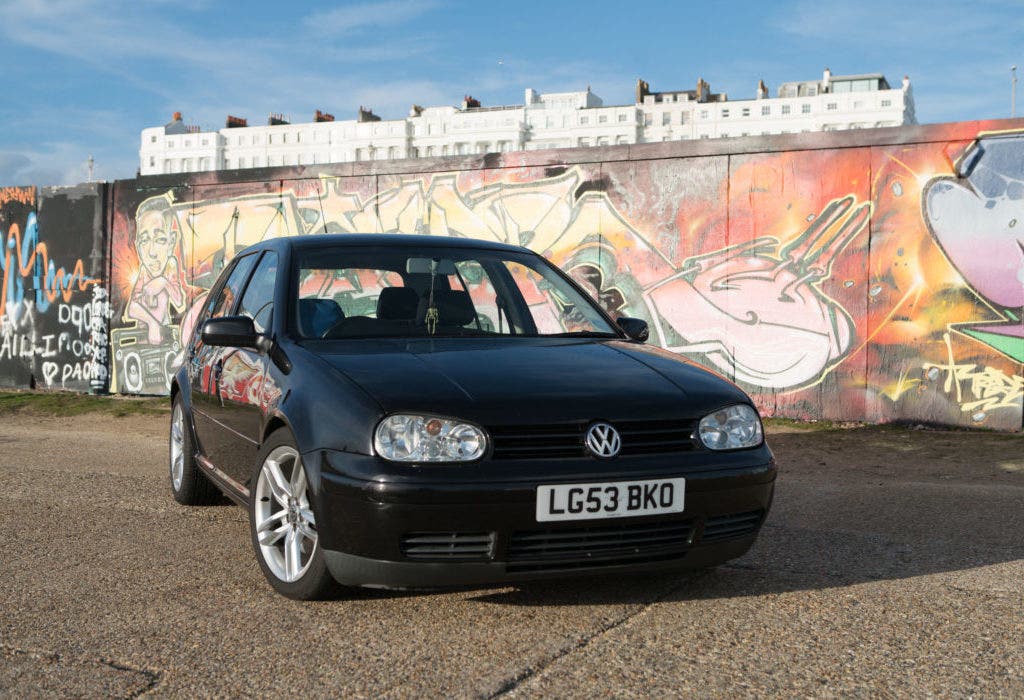Golf Mk4 Buying Guide
Strong, practical and with all the credentials to become a classic in its own right. Now is the time to buy a Golf Mk4. Let us steer you straight with our VW Golf Mk4 buying guide!
It sounds just like a Golf...
Whether you're after an older daily driver or a modern classic project to tinker with, the Golf Mk4 makes a lot of sense. It looks smart and retains that solid feel that is so familiar to Golf owners, with the benefit of some really good engine options. Mk4 Golf parts are cheap to buy and as far as tinkering possibilities – the sky really is the limit.

The Mk4 Golf model history
When it was announced in November 1997, the Mk4 Golf range included a three and five-door hatch with 1.4, 1.6, 1.8 GTi, 1.8 Turbo GTi petrol engines and 1.9 diesels in SDi and TDi format. Initially, the old convertible and estate from the Mk3 range continued in production until the following year. In July 1998, the Golf Mk4 convertible was announced using a Mk3 body with the new nose, a refreshed tail end as well as a revised interior. The 2.0-litre GTI was added to the range in March 1999 and by August, an estate Golf was available with the option of either a 1.6, 1.8 or 2.0-litre petrol engines or the 1.9 TDi or SDi diesel. Later that year Pompe Duse (PD) technology appeared, with the 1.9 version now producing 115bhp. In 1999 the booted Bora (or Jetta Mk4 in the US) came on the scene. With a distinctive front end, I personally think it has aged brilliantly - I did own one for quite a few years. A favourite with Sales Reps and Sunday drivers they're split into a two main camps when it comes to the classifieds. Low mileage, typically petrol engine automatics in burgundy and gold. Higher mileage TDI models in shades of silver, black and blue. You can't be too picky on colour, as unlike Golfs they aren't everywhere, but they are a great car with huge luggage space. In early 2000 the 2.8-litre V6 4-Motion arrived and in December the range was graced by the equally potent 2.3-litre V5. For those keen on fuel economy, with a decent helping of torque June 2001 saw the introduction of a feisty 130bhp version of the PD engine. Arguably the cream of the crop, especially from an investment point of view is the 4 wheel drive R32 with its 3.2 V6 engine, producing 238bhp. At the time it was the most powerful VW ever produced. For reference, the black 5 door Golf in our photos is a 1.9 TDI model.


Mk4 Golf Engine Options
We'll be honest, performance from the smaller petrol engine models is a little lacklustre and the 1.8 and 2.0-litre GTi models may not live up to your GTi expectations. If you want a GTI badge, the one to buy is the 1.8T which is rapid and reasonably frugal. Starting life with 150bhp, all GTI models can be re-mapped, but the later 'fly-by-wire' version offers the best potential for releasing extra ponies. The 2.3 V5 and 2.8 V6 offer lots of pulling power and a great induction noise with a performance air filter fitted but they tend to be quite thirsty. Whilst they have displacement on their side over the GTI, when it comes to quick tuning they fall short of making big numbers with a remap. The V5 is prone to both coil pack and software issues, so one that’s not running right is probably best left alone. Regular servicing is key to keeping a Golf's otherwise bulletproof powerplant in good health, so be sure to see evidence that this has been done. That means looking for proof that the cambelt has been changed every 50-60k miles and there’s been regular oil and filter changes. Cars where this has been ignored, or where the wrong specification oil has been used, may have a build-up of sludge in the sump – and this seems to be a particular problem on the 1.8 Turbo model. Where a new cambelt has been fitted, check to see whether a new water pump went on at the same time. The impellers have a horrid tendency to come loose on their spindles; the unit is located in the cambelt housing. Any cooling problems should be easy to spot on a test drive if you keep a close eye on the temperature gauge.
Buying a Mk4 Golf TDI
The Mk4 Golf range really championed the diesel engine and there's always a strong demand for a decent 1.9 TDI, including the GTI styled GT TDI. We wouldn’t bother with the 90bhp version, but the 110 and 115 are pokey enough. The 130 is probably the pick of the bunch and whilst it hands 20bhp to the hasty 150bhp version, it has less of an appetite for camshafts, which could be costly in the long run. Try and purchase a TDI with a 6-speed gearbox. It will really help with the economy and your long-distance driving pleasure. Keep an eye on the temperature gauge whilst driving. Due to tight tolerances on the cylinder head if a PD engine has been allowed to overheat you'll need to throw it away, rather than just skim the surface. Get ready to walk away or spend the best part of £500 on a replacement if that is the case. Be sure to test the turbo under load before handing over your cash. Pop it into 4th at around 20mph and floor it - the car should pick up all the way through to big numbers. If it doesn't it could be new turbo time.

The Mk4 Golf GTI Anniversary
With a car collectors hat on there are a few to keep a beady eye out for. The first is the GTI Anniversary edition, which was a model to celebrate 25 years of the GTI. With a specific styling package consisting of a new front lip, side skirts and rear valance, along with BBS wheels and celebratory interior with black leather and silver highlights. These are already in the hands of collectors, but will only go up in value.

Buying a Mk4 Golf R32 as an investment
As mentioned earlier, the R32 was the most powerful VW ever produced at the time, and they quickly became a cult classic. With a limited colour choice (Black, Red, Blue, Silver) Koenig sports seats, multi-spoke wheels and the raucous 3.2litre engine, they were available in 3 and 5 door configuration. Historically speaking, sporty Golfs with 3 doors have always commanded a higher price tag than those with 5, discounting the more-door only Mk2 Golf G60 Limited from the equation. The lower the mileage and the more original the better if you are considering buying a Mk4 Golf as an investment.

Mk4 Golf Transmission
Volkswagen has always prided itself in producing some of the slickest gearboxes around and there shouldn’t be any glaring problems. That said, many employ a dual-mass flywheel and if it starts rattling you can expect a big bill to replace it. We’re talking about roughly £400 for all the parts plus five hours’ labour. Other gearbox issues concern the diff bearings; they get noisy and if the rivets on the crown wheel come lose the diff can spit itself out of the casing.

Running gear
Golf Mk4 underpinnings are strong and dependable, so simply carry out the usual checks when buying. Broken coil springs, worn wishbone bushes or anti-roll bar links are all par for the course on older cars but replacement Mk4 Golf suspension parts are inexpensive. Incidentally, the ARBs were originally plastic but have since been replaced by sturdier metal items. The rear axle bushes wear with age and can make the rear end wander whilst driving. You can often hear them knocking as they move around over bumps and through corners. Allow for a 3-4 hour job at your workshop of choice, as you need to cut out the old bushes the press in the new ones with a special tool. Some Technicians will suggest fitting a polyurethane upgrade at this stage in the vehicles life.

Mk4 Golf Body issues
The Mk4 Golf doesn't rust badly, especially in comparison with the earlier versions. However, localised spots on the wings, sills, doors and tailgate are commonplace. Of course, a cursory glance underneath will help put chassis corrosion concerns to bed.




Mk4 Golf Interiors
Stylistically, the Mk4 Golf interior has aged rather well. Most options were pretty tasteful, although VW did see fit to sneak some faux walnut trim into more executive models. Basic seat options aren't bad and offer more support than their predecessors. The GTI / large bolster sport seats are great for a long journey, and offer additional adjustment to assist with driver comfort. As always Recaro badges along with leather command a premium, but expect to find wear on the outer edges where owners have slid in and out for the past 20 years. Watch out for water ingress inside the cabin. Blocked sunroof drain pipes are likely to be the cause of a damp front passenger footwell. They run inside the headlining making them a little tricky to trace/replace - so the first test should be with an airline when you get home. If the boot floor carpet’s sodden, then point your finger at the rear wiper motor. The plastic supply tube runs through the centre of it but when it leaks it destroys the motor and in turn the microswitch for the boot opener. This floods the boot and can lead to the alarm to going off by itself.

Mk4 Golf Electrical problems
A big difference with the Mk4 Golf over the outgoing Mk3 model was the dependence upon electronics to make the car operate correctly. When they all work, it's great... Be wary of any Golfs with an ABS light that either fails to light up when the ignition is turned on (perhaps someone has removed the bulb) or stays on when the engine is running. It could be down to wheel sensor issues or, worse still, the ABS unit itself. This will mean replacing the whole module. Reconditioned units start at around £200, so make your offer to buy accordingly. Both the 1.4 and 1.6 petrol cars can suffer from running problems to do with various engine management sensors and ECU software upgrades making niggly misfires, stalling or general rough running a common malady. A common culprit of rough running is the engine management temperature sensor. Other poor running issues can be due to air mass meters, duff coil packs or too big a spark plug gap. A workshop, ideally a VW specialist can plug your car in to help diagnose - if you go with an experienced VAG technician what you'll pay extra in hourly rate you'll save in incorrectly fitting new parts and not solving the issue. Most cars have aircon, so as always check this works. If there's a horrible noise when in use, or the heaters don't blow then you could have issues. Electric windows are a regular failing point on the Mk4 platform, leaving owners with a door glass stuck in the downward position. Upon removing the door panel you'll discover a metal plate with the mechanism and motor attached, and you'll also have to remove the door handle to access it all properly - It's not a nice job, but it is do-able at home on the drive. Try locking the doors both on the key fob and at the handle - issues with micro switches can cause the vehicle to not lock, or flip flop between open and closed.

Should I buy a modified VW Golf Mk4?
Well... It all depends on what your plans are for the car. A modified Mk4 Golf is likely to have had a hard life, especially a 1.8 Turbo model. They were from an age of cheap remaps, cheap turbos and cheap coilovers... Built on a budget to match the cars in magazines, but potentially thrashed within an inch of its life and serviced every other year. On the plus side, there are some great track-focused Mk4 Golfs that could save you a fortune over the build price and some epic show cars that if built correctly to start with, will serve you well. If you are looking to return a modified Mk4 Golf to standard, then take our advice from earlier and stick with either an Anniversary GTI or R32.

How much is a Golf Mk4?
The Mk4 Golf is potentially the cheapest Golf available at the moment as Mk3 Golf prices are only going up (read our Mk3 Golf Buying guide here). You could get lucky with a high mileage 'part-ex to clear' example for £500 but don't expect to be turning heads at the petrol station, or driving it in 12 months time without doing some work. A non-Turbo GTI will be a cheap ride, but if you hold out for the 20v Turbo engine you'll need to spend a couple of grand for a car that's worth owning. A nice Anniversary will be heading towards £5k and the R32 knocking on £10k depending on condition. A reliable TDI will come in around £1500 if you want the peace of mind of an up to date service schedule; this can easily double if you want low miles, decent paint and a nice colour. The post-2002 TDI models benefit from the emissions-related vehicle tax in the UK making them half the price of a GTI to drive on the road, and cheaper even than a 1400cc petrol model to tax for a year.

Feeling ready to buy a Mk4 Golf?! Best of luck and let us know how you get along by tagging your pics with #driveheritage Andy / Ian




 Beetle
Beetle
 T2 Bay
T2 Bay
 T2 Split
T2 Split
 T25
T25
 Transporter T4
Transporter T4
 Transporter T5
Transporter T5
 Golf Mk1
Golf Mk1
 Golf Mk2
Golf Mk2


 911
911
 996
996
 997
997
 986 Boxster
986 Boxster
 987 Boxster
987 Boxster
 912
912
 944
944
 924
924


 Defender
Defender
 Discovery Series 1
Discovery Series 1
 Discovery 2
Discovery 2
 Series 1, 2 & 3
Series 1, 2 & 3
 Freelander
Freelander
 Freelander 2
Freelander 2




